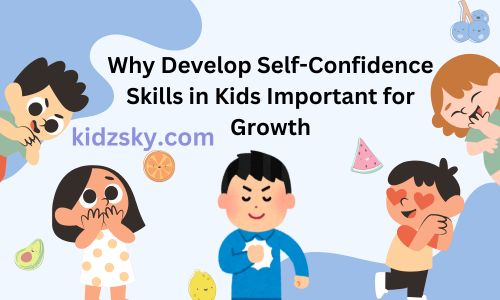Self-confidence is one of the most important traits a child can develop; in this blog, we will discuss Develop self-confidence skills in kids.
It affects their behavior, social interactions, academic success, and happiness. Confident kids are more likely to take on challenges, build healthy relationships, and cope with setbacks in life.
As parents and teachers, it’s essential to support children in building this crucial skill.
In this blog, we’ll explore how to develop self-confidence skills in kids, why it’s essential, and what actions & how parents and educators can take to nurture a confident mindset in children.

Why Develop Self-Confidence Skills in Kids Important for Growth
Confidence plays a critical role in a child’s development. Here are some reasons why it’s so important:
- Helps Kids Face Challenges: Confident children are likelier to face new challenges without fear. They believe in their abilities and are willing to try, even when tasks seem difficult.
- Improves Social Interactions: Children with strong self-confidence are more comfortable engaging in social activities. They can make friends more easily, communicate their needs, and handle peer pressure better.
- Encourages Independence: Confidence empowers kids to take initiative and act independently. This will be especially beneficial in academic settings where kids may need to work on projects or assignments without constant supervision.
- Promotes Mental Well-being: Self-confidence contributes to a child’s emotional health. Kids who feel good about themselves are likelier to have a positive outlook on life and can bounce back more quickly from failures or setbacks.
- Builds Resilience: Confident children learn that mistakes are part of learning. This resilience allows them to face disappointments with a stronger mindset, knowing they can overcome future challenges.
Parents and educators play an essential role in helping to develop self-confidence skills in kids, and the strategies used to foster this confidence can have a lasting impact on their careers and future success.
New Blog:- 5 Best Ways to Navigating Homework Challenges

Steps to Develop Self-Confidence Skills in Kids
So, Now we know the importance of confidence in children, let’s discuss how to help children build this quality actively. Here are some actionable steps that both parents and teachers can follow to develop self-confidence skills in kids:
- 1. Encourage Independence
One of the best ways to build confidence is to allow children to take on tasks independently. Whether it’s dressing time for themselves, solving homework challenges, or making decisions, independence helps kids realize they can handle things independently.
However, it’s good to offer support to your kids whenever needed. Teaching independence doesn’t mean leaving a child to struggle; instead, it means guiding them when necessary and letting them take the lead in figuring things out.
- 2. Celebrate Effort, Not Just Success
While praising a child for getting good grades or winning a game is natural, celebrating their effort is just as important, even if they didn’t achieve the desired result.
This helps kids understand that trying hard is what matters most. Children might shy away from challenges when we focus only on the outcome because they fear failure.
Always acknowledging their effort, whether they succeed or not, helps develop self-confidence skills in kids by showing them that growth and learning come from trying.
- 3. Provide Positive Feedback
Feedback is critical to building confidence. However, how feedback is delivered can either boost or damage a child’s self-esteem. When offering feedback, focus on the positives before addressing improvement areas.
For example, if a child makes a mistake on a math problem, begin by praising their effort in trying to solve it, then guide them through the correct method. Positive reinforcement helps children feel capable while also showing them how to improve.
- 4. Set Realistic Goals
Setting small, achievable goals helps kids build their confidence step by step. When children accomplish these goals, they feel a sense of pride in their achievements. They’ll feel more prepared to tackle more significant challenges as they gain confidence in their abilities.
Setting goals appropriate for the child’s age and development level is essential. This ensures that they experience success without feeling overwhelmed by tasks that are too difficult.
- 5. Be a Role Model
The significant point is that every child from 1st year learns things by observing the behavior of the adults around them. To help develop self-confidence skills in kids, you must model self-confidence. Show them how you handle challenges, mistakes, and setbacks positively.
Let your child see you trying new things, facing difficulties, and maintaining confidence even when things fail. This demonstrates that it’s okay to be imperfect and that confidence comes from perseverance.
- 6. Create a Safe Environment for Learning
Kids need to feel safe when they’re learning and growing. Create an environment at home or in the school or classroom where they can be encouraged to ask questions, make mistakes, and express themselves without fear of judgment.
When children know they won’t be ridiculed for their mistakes, they’re more likely to try new things and build confidence. A supportive and nurturing environment goes a long way in helping to develop self-confidence skills in kids.
- 7. Encourage Problem-Solving
They teach kids to think critically and solve problems, boosting their self-esteem. Encourage children to devise solutions to their problems, whether figuring out how to fix a toy or resolving a disagreement with a friend.
Problem-solving skills help kids feel empowered, knowing they can handle challenges that come their way. The more they practice this skill, the more confident they become.
- 8. Avoid Comparison
Every child develops at their own pace, and comparing them to others can damage their self-esteem. Avoid comparing your child to siblings, classmates, or friends. Instead, focus on their progress and celebrate their achievements.
Comparison often leads to feelings of inadequacy, while focusing on a child’s unique strengths and improvements helps them build a healthy sense of self-worth.
Our Popular Post:- How to Improve Parent-Teacher Communication

Building Confidence Through Positive Reinforcement
Positive reinforcement is one of the most effective tools for helping children build confidence. But it’s crucial to balance praising too much and giving genuine recognition.
When using positive reinforcement, be specific about what you’re praising. For example, instead of saying, “Good job,” say, “I’m proud of how you solved that puzzle!” This helps the child understand what they did well and reinforces their abilities.
You can also use small rewards or incentives to motivate kids. However, ensure that the focus remains on their effort, not just the reward. It will be good for develop self-confidence skills in kids.
Also Read:- Top 10 Best Physical Games for Kids

The Role of Teachers in Developing Confidence
Teachers play an equally important role in helping to develop self-confidence skills in kids. Teachers can make students feel valued and capable by fostering a positive and supportive classroom environment.
Here are some tips for teachers to help develop confidence in students:
- Create Opportunities for Success: Provide students with tasks that challenge them without overwhelming them. Celebrating small victories in the classroom helps build their confidence.
- Promote Collaborative Learning: Group activities where students work together to solve problems can build teamwork and self-assurance.
- Encourage Questions: Let students know that asking questions is valuable to learning. This encourages them to speak up when unsure, boosting their confidence.
Conclusion
Helping to develop self-confidence skills in kids is a lifelong process that requires patience, encouragement, and understanding.
By fostering a positive and supportive environment, parents and teachers can help children build the courage and confidence they need to face life’s challenges.
Confidence allows children to grow into capable, resilient individuals who believe in themselves. When we nurture this essential trait early on, we set our kids on a path toward success, happiness, and personal fulfillment.
We request you to share this article and spread the information.
Admin creates all Photos used in this blog in Canva.





Pingback: Why We Should Teach Kids About the Environment: 4 Example
Pingback: Extracurricular Classes for Kids: Best 10 Robotics, Sports &
Pingback: How to Find the Best School for Your Kids: 9 Points to Remem